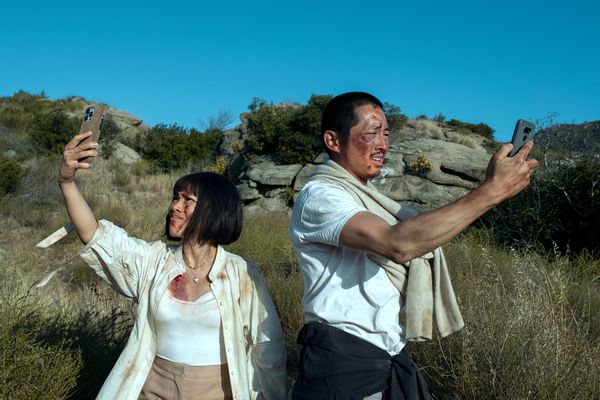From the moment Ali Wong's Amy Lau opens her husband George's safe, "Beef" flips the plot into a tale about much more than simple road rage. This happens well into the premiere, and Amy believes she's alone in her custom-designed Calabasas home. She opens her husband's day planner, figures out the safe's combination and, once it's breached, she gingerly reaches inside and procures a handgun.
There's no anger in her facial expression. Coloring it instead is a familiar desire. Amy removes the full mag and clicks it back into the grip empty, finds a place on her bedroom floor, and begins caressing herself with the barrel. She places it against her neck, pulls the trigger, and lets out a groan as it clicks. Then she drags the muzzle across her lips before pressing it between her legs. With each empty click, she lets out a pleasurable sound. Her masturbatory break continues until it's interrupted by her nemesis, Danny Cho (Steven Yeun), ringing her doorbell.
In that instant, Amy doesn't yet see Danny as her enemy. It's only when he talks his way into her house that you see Wong subtly fix her grin in way that hints Amy is entertaining a dangerous fantasy. He's a handsome contractor and, like a line from a porno, he's asked her if her husband is at home. She doesn't realize that the reason Danny's inquiring is because he wants payback.
Danny assumes Amy's husband was driving the car that lured him into a vicious chase through the streets. When he finds out that Amy is the villain he's been looking for, he pisses all over her bathroom floor, sending her flying into the streets after him as he runs to his truck, smiling all the while. She also gets his license plate number as he makes his escape, assuring their war will continue. Then she also smiles.
What is that other part of the quote about all being fair, the companion state to war? Ah yes: Love. Of course, "Beef" isn't proposing in that scene that Amy and Danny will get together in the classic romantic sense. Nor does it allude to that in its final frames where, for reasons earned in the events leading up to the closer, the two end up in bed together. A hospital bed.
Instead, between Amy taking pleasure from her husband's firearm to compensate for the "vanilla" sex that's left her marriage cold to her driving over a cliff beside the man who hates her, "Beef" thoughtfully digs into the strange intimacy that can fruit from protracted spite. Not from obsession, which is where Danny and Amy's hateful exchanges begin, but drawn-out wrath.
If we're finding difficulty with placing a finger on whatever is underlying Danny and Amy's conflict, maybe that's because the buzz enveloping their devotion to mutual destruction is oddly erotic.
"Beef" thoughtfully digs into the strange intimacy that can fruit from protracted spite.
Each has a lot to be frustrated about, but nowhere to express it effectively until they meet one another. First Danny and Amy find one another's homes, then they hit each other where they live, proverbially speaking. Amy does this partly through sex, seducing Danny's lazy brother Paul (Young Mazino). Danny returns the favor by catfishing Amy's husband George (Joseph Lee) by pretending to be an empathetic friend named Zane.
Both moves are motivated by a similar sense that the other person can take it. All that Danny knows about Amy at first is that she's a rich privileged woman who doesn't appreciate how good she has it. To Amy, Danny is a shabby workman who invaded her sanctum, the one she paid for with her own money and barely enjoys.
 Ali Wong as Amy and Joseph Lee as George in "Beef" (Andrew Cooper/Netflix)
Ali Wong as Amy and Joseph Lee as George in "Beef" (Andrew Cooper/Netflix)
Nobody respects Amy's sacrifice or her desire for calm, her yearning "to be taken care of," as she tells George. Out of everyone else in her life, though, only Danny is a target she can destroy with little to no consequences. She's a famous influencer about to transform her work into a multimillion-dollar payout. Who is he?
Creator and showrunner Lee Sung Jin placed so much care into the smallest details that assuredly nothing about Danny and Amy's extended conflict is accidental or slapdash. This includes the way their fixation takes the shape of courtship. Lee met Yeun and Wong when they worked together on the animated series "Tuca & Bertie," where they voiced a pair of characters who date.
Amy and Danny's energy toward one another trades sweetness and consideration for the type of unhinged passion that razes lives to nothing but ash. You can hear it in Amy's voice as she leaves a voicemail for Danny moments after an unresolved fight with her husband, which she purrs in a voice worthy of a BDSM queen.
"I would love to let this go. I have a very full life that I'd love to get back to," Amy coos, adding with arousing, pornographic flourish, "Oh, it's so full. You wouldn't know what to do with its fullness. But here's the thing. Actions have consequences. So I'm gonna find you and take what little you have." It's terrifying. It's also weirdly hot . . . until Danny finds Amy has painted demoralizing phrases on his car.
Displaced anger is the heart of Amy and Danny's story. If they were simply a pair of people having a terrible day when their lives converged in a hardware store's parking lot, maybe they could have let it go. But Amy's marriage is withering as her plant business thrives, and Danny's efforts to establish himself as a contractor have netted him next to nothing, save for bouts of suicidal ideation. He finds some solace in his faith when he discovers a church community to join, but spiritual comfort isn't enough to buy a house for his parents.
Explosive rage can be cathartic, as any therapist will tell you. What they don't often describe, what probably can only be experienced, is the sense of calm that comes before the regret, if regret ever comes. Unloading your pent-up ire on someone is never right, not even if they have it coming, we're told.
 Steven Yeun as Danny and Ali Wong as Amy in "Beef" (Andrew Cooper/Netflix)
Steven Yeun as Danny and Ali Wong as Amy in "Beef" (Andrew Cooper/Netflix)
But here's the dirty little secret that well-meaning professionals don't say to the clients they advise to redirect aggression toward heavy bags, break rooms, or long-distance runs: there's simply no substitute for verbally devastating another richly deserving human being. Done properly, it can feel downright orgasmic.
Another is that anger is a luxury – an emotion available to all but that very few can wield without consequence, especially not people of color. This explains why Maria Bello's venture capitalist investor Jordan is both highly entertaining and deeply aggravating.
Bello dabbles in the full palette of the state we'd call "unbothered" as Jordan inconveniences and insults everyone around her. "OK, hopefully, she'll get more polite as she gets older," she drawls, rolling her eyes when Amy and George's little girl June (Remy Holt) plays shy upon meeting her.
Anger is a luxury – an emotion available to all but that very few can wield without consequence, especially not people of color.
Later, after Jordan has broken up her brother's marriage and claimed his wife Naomi (Ashley Park), who is also Asian, she dismisses Naomi from an impromptu meeting with Amy as if her lover is her servant.
"She's so attentive," Jordan tells Amy after Naomi leaves the room. "Is that a cultural thing, or . . .?"
"No Jordan, it's not a cultural thing," Amy says in a tone that could be interpreted as patience but, at this point in the story, we recognize as stuffed-down resentment. Jordan is an appropriator, but in a far worse way than some Coachella festival bunny wearing a sacred Indigenous headdress as a costume. She plunders artifacts, people and her subordinates' lives. She wants for nothing.
When the wages of Amy's rage bring violent men into Jordan's fortress, the wealthy white woman's privilege ends up being her undoing, and her gruesome comeuppance becomes the plot's big "O." Jordan and Naomi run for the house's panic room, but Naomi gets there first, pushing the automatic button to close the door too soon for Jordan to make it through all the way. Instead, it chomps her in half.
You could say that Amy and Danny's quarrel finally ate someone alive. Then again, if their fury required a sacrifice, few figures in this opera are more deserving than Jordan.
Want a daily wrap-up of all the news and commentary Salon has to offer? Subscribe to our morning newsletter, Crash Course.
How the intermingling of these ingredients plays out in "Beef" may provide some explanation as to why it is currently the most popular title on Netflix. Anger is seductive and, right now, omnipresent. At a time of rampant uncertainty, it's a means of claiming power and, bizarrely, establishing a relationship with other people.
What is an outburst, after all, if not a person demanding to be seen, heard and have their right to take up space acknowledged? This is no comfort to the flight attendants and service industry staff taking the brunt of such aggression but, in its rawest form, that's what these pandemic lash-outs are.
 Steven Yeun as Danny and Ali Wong as Amy in "Beef" (Andrew Cooper/Netflix)
Steven Yeun as Danny and Ali Wong as Amy in "Beef" (Andrew Cooper/Netflix)
Much of the discussion about the ending of "Beef" concerns the violence of the scenes leading up to it and the ending's ambiguity. The understanding is that they have not discovered love but, rather, a sense of sameness after surviving simultaneous car crashes in the penultimate episode, getting lost in the wilderness and, in an act of hungry desperation, consuming what Amy believes to be elderberries.
Elderberries can be medicine when properly prepared, but are poisonous when eaten raw. The pair violently puke every reserve of bile they have until they begin hallucinating, then seem to switch bodies.
"I see your life," says Amy, in Danny's body. "You poor thing. All you wanted was to not be alone."
Danny replies, through Amy, "You don't have to be ashamed. It's OK. I see it all. You don't have to hide. It's OK."
There, at last, they find the parity they don't have in society. "We should have done this more often." "What a waste." "At least we did it once . . . This is nice."
There's nothing sexual about what happens next. Danny and Amy emerge from that valley healed but on the verge of plunging into ruined lives. One more time and because of Amy, Danny almost loses his entirely. This finally draws her into Danny's hospital bed to spoon his motionless body until, in the show's final seconds, he puts his arm around her. None of this means the two are satisfied but they are, at the end of it all, spent – and you can probably bet that Amy's over screwing with guns.
All episodes of "Beef" are streaming on Netflix.
Read more
about Ali Wong and Steven Yeun



Shares